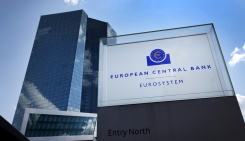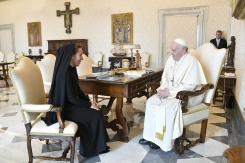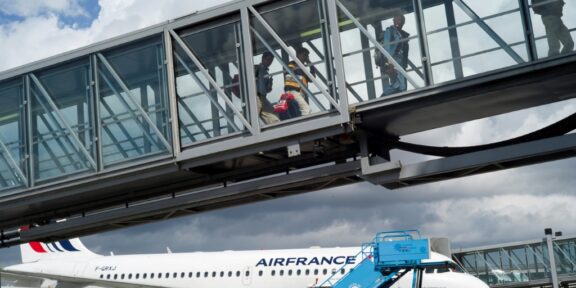
The European Central Bank on Thursday raised borrowing costs a quarter percentage point, taking a key rate to its highest level since early 2001 as its battle against surging inflation reached the one-year mark.
The central bank’s ninth straight increase took the closely-watched deposit rate to 3.75 percent — a level last seen in May 2001 and equal to its previous record high.
Borrowing costs have risen at their fastest pace ever in the bank’s year-long hiking cycle to fight inflation.
In all, key rates have risen by 4.25 percentage points since the ECB made its first move in July last year after Russia’s invasion of Ukraine sent prices for energy and food soaring.
Inflation was “still expected to remain too high for too long”, the ECB said in a statement announcing its latest decision.
Consumer prices in the eurozone rose at 5.5-percent pace in June — down from last year’s double-digit peak but still well above the ECB’s two-percent target.
The ECB decision came a day after the US Federal Reserve resumed its own hiking cycle with a quarter-point raise.
The US central bank signalled it could raise rates again if inflation proved stubborn, while there was growing uncertainty about the ECB’s determination to hike further, with the eurozone economy looking increasingly weak.
Collectively, the 20 countries in the currency bloc fell into recession around the turn of the year, shrinking for two straight quarters.
- Core and more –
Observers will be listening closely to ECB President Christine Lagarde’s press conference at 2:45 pm (1245 GMT) for an indication of whether the institution will continue with hikes at its next meeting.
Previously, Lagarde has indicated it was “unlikely” that ECB policymakers would be able to say any time soon whether rates had peaked.
Inflation was still “working its way through the economy in phases”, she said at the end of June.
The recent moderation in inflation was “mainly due to the reduction in the annual growth of energy prices” that shot up as a result of the war in Ukraine, said Eric Dor, a director at the IESEG business school.
Overall, inflation would “drop further over the remainder of the year but will stay above target for an extended period”, the ECB said Thursday
“While some measures show signs of easing, underlying inflation remains high overall,” the central bank said.
Core inflation — a closely watched measure that excludes volatile energy, food, alcohol and tobacco prices — in fact rose to 5.4 percent in the eurozone in June, from 5.3 percent in May.
Officials at the Frankfurt-based central bank are now more worried about the impact of rising wages as workers demand higher salaries to cover increased costs. - ‘Wait-and-see’ –
Despite the already bleak economic outlook, policymakers would “insist on a data-dependent, wait-and-see approach” in coming months, said Salomon Fiedler, economist at Berenberg Bank.
But uncertainty over the future course of interest rate rises could already be found among members of the ECB’s governing council ahead of Thursday’s meeting.
More hikes beyond July would “at most be a possibility but by no means a certainty”, the head of the Dutch central bank, Klaas Knot, said earlier in the month.
Steep interest rate rises have also provoked an angry backlash from political leaders in southern eurozone countries, where debt levels are higher.
More hikes “could create a more difficult situation for growth at the European level”, Portuguese Finance Minister Fernando Medina said ahead of the meeting.
Italy’s far-right Prime Minister Giorgia Meloni similarly blasted the ECB’s “simplistic recipe of raising interest rates” and warned “the cure risks proving more damaging than the disease”.








